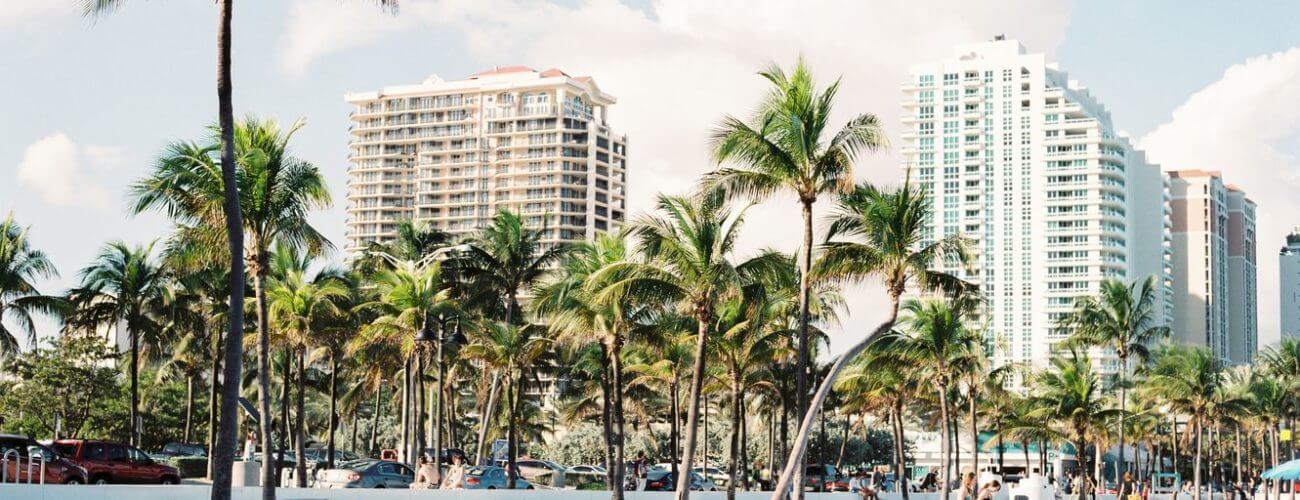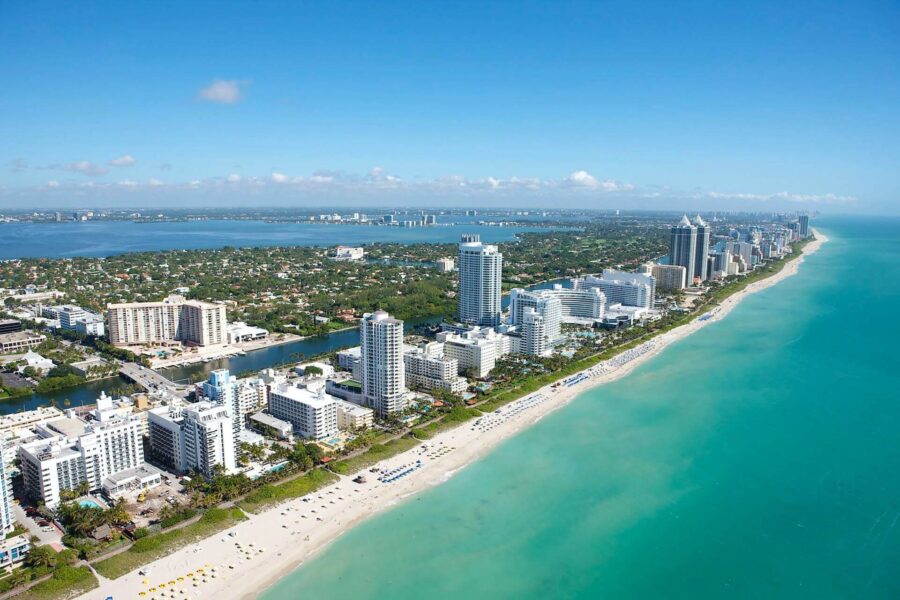

Moving to Miami? Here’s Everything You Need to Know
Posted in City Guides on November 15, 2023
Moving to Miami, Florida, is an exhilarating decision that promises a vibrant and dynamic lifestyle in one of the most iconic cities in the United States. Nestled along the picturesque shores of South Florida, the city boasts a unique blend of cultural diversity, beautiful beaches, and a thriving nightlife scene. So, get ready to dive into the Magic City’s endless possibilities as we embark on this exciting journey of moving cross-country together.
Moving to Miami, FL, is an exciting adventure of exploring a city with a warm climate, vibrant lifestyle, excellent school system, growing economy, and diverse neighborhoods. It offers opportunities for various lifestyles, from families to young professionals and retirees. Whether you’re considering housing options or managing daily expenses, careful planning is key. For a smooth move, consider hiring reliable moving services.
Why Choose Miami?
Miami stands out as an enticing place to call home for a variety of compelling reasons. Its subtropical climate is a major draw, offering warm winters and sunny summers that allow for year-round outdoor activities. Beyond the weather, Miami’s renowned beaches, diverse culture, and vibrant lifestyle options make it a dynamic destination. Whether you’re an art enthusiast, a food lover, or simply seeking a change of pace, the city’s welcoming community has something for everyone.
The Beautiful Climate and Beaches
Miami’s climate is a year-round blessing, characterized by mild, dry winters and hot, humid summers. With temperatures typically ranging from the low 70s to the high 80s degrees, it’s known as the “Sunshine State” for a good reason. This inviting, warm climate sets the stage for an active lifestyle, with opportunities for beach days, water sports, and picnics in the city’s beautiful parks.
The beaches are legendary, offering diverse experiences for all preferences. South Beach, with its iconic Art Deco architecture and lively atmosphere, is a hotspot for sunbathing and people-watching. But you can also find tranquility in places like Key Biscayne. Miami’s sandy shores and turquoise waters provide residents with constant relaxation and recreation.
Vibrant Culture and Lifestyle
Miami’s cultural mosaic is a vibrant tapestry woven from traditions, languages, and cuisines from around the world. This rich multicultural heritage is reflected in the city’s arts scene, festivals, and culinary delights. Explore Little Havana for authentic Cuban cuisine, visit the Pérez Art Museum for contemporary art, or immerse yourself in the music and dance scene, influenced by Latin rhythms.
The Miami lifestyle is synonymous with energy and excitement. The city boasts legendary nightlife with top-notch clubs and entertainment venues. Beyond the nightlife, there’s a wealth of outdoor activities, from boating in Biscayne Bay to exploring the Everglades National Park. Sports enthusiasts can cheer for professional teams in basketball, football, and baseball.

Preparing for the Move
Preparing for relocating to Miami, like any major relocation, requires careful planning and organization to ensure a smooth transition and an efficient move. Whether you’re moving locally or from a distant location, here are some essential steps to help you get ready for your move to the Magic City.
Implement These Packing Tips
Packing efficiently is a crucial part of any move, and it can significantly reduce the relocation stress associated with the process. Start by decluttering your belongings and deciding what to keep, donate, or get rid of. Invest in high-quality packing supplies, such as sturdy moving boxes, packing tape, bubble wrap, foam peanuts, and moving labels. Pack room by room, labeling boxes with their contents and destination in your new home.
Fragile items should be wrapped securely, and valuable items should be transported separately or insured. Don’t forget to pack a box with essential items you’ll need immediately upon arrival, such as toiletries, a change of clothes, and important documents. Watch this video if you’d like more packing tips.
Choosing a Moving Company
Selecting the right moving company is a crucial decision that can significantly impact the long-distance moving process. By hiring long-distance movers and their cross-country moving services, you can make the whole relocation process easier. Professional packing services will not only ensure all your belongings are safely packed and protected throughout transport but also allow you to have a stress-free relocation as movers will take care of all the heavy lifting. To ensure a smooth and safe move, consider the following tips when choosing a moving company:
- Research and compare – start by researching several moving companies in the area. Obtain quotes from multiple companies to compare prices and services.
- Check credentials – verify that the moving company is licensed and insured. This is essential for your peace of mind and the safety of your belongings. You can check if a company is legitimate on sites like the Better Business Bureau.
- Read reviews – look for online reviews and testimonials from previous customers. Pay attention to any red flags or consistently negative feedback.
- Ask for recommendations – seek company recommendations from friends, family, or colleagues who have recently moved. Personal referrals can provide valuable insights into a company’s reliability.
- In-person estimate – request an in-person estimate from the moving company. This allows them to assess your belongings accurately and provide a more accurate quote.
- Questions and clarifications – don’t hesitate to ask questions about their services, policies, and any additional fees. Clarify details such as the timeline, packing services, and insurance options.
- Check for hidden costs – ensure that there are no hidden costs or unexpected charges in the contract. Read the fine print carefully before signing any agreements.
- Plan ahead – schedule the move well in advance to secure the preferred moving date. Last-minute bookings can be more expensive and less flexible.
Schools in Miami
For families moving with children, the quality of education is often a top consideration when deciding where to live. In Miami, you’ll find a range of education options to suit your family’s needs. Whether you’re interested in public schools, private institutions, or higher education opportunities, the city offers a diverse array of educational choices.
There Are Many Quality Public Schools
Miami-Dade County Public Schools (M-DCPS) is the fourth-largest public school district in the US, serving over 340,000 students across 392 schools. M-DCPS is known for its diverse student population and commitment to academic excellence. The district offers various magnet programs and specialized schools focusing on areas such as STEM, the arts, and international studies. Parents have access to a wide range of public school options, and M-DCPS continually strives to provide quality education to its students.
Private Schools Are Also a Popular Choice Among Parents
Miami is home to a plethora of private schools catering to various educational philosophies and religious affiliations. Notable private schools include Gulliver Schools and Ransom Everglades School, among others. These institutions often offer smaller class sizes, personalized attention, and unique educational programs. The diversity of private schools allows parents to choose an educational environment that aligns with their values and priorities.
When It Comes to Higher Education, Miami Has Some of the Best Schools in the Country
Miami is not only a great place for K-12 education but also offers numerous higher education opportunities. The city is home to several universities and colleges, including the University of Miami – ranked among the top universities in the country, Florida International University (FIU,) and Miami Dade College (MDC). These institutions offer a wide range of undergraduate and graduate programs across various fields of study.

Job Market in Miami
Miami’s job market is known for its vibrancy and diversity, making it an attractive destination for job seekers. With a growing economy and its strategic location as a gateway to Latin America and the Caribbean, the city offers a wide range of employment opportunities. We’ll now delve into the city’s employment landscape, highlighting key industries that are thriving and providing valuable job search tips for those seeking opportunities in this dynamic city.
Choose from the Top Industries
Several industries thrive in Miami, contributing to its economic vitality. The tourism and hospitality sector benefits from the city’s beaches, nightlife, and culture, creating numerous jobs in hotels, restaurants, and entertainment. Miami’s strategic location also facilitates international trade, offering opportunities in logistics, import/export, and transportation.
The city’s finance sector focuses on international banking, wealth management, and financial services, while its healthcare industry includes hospitals, clinics, and research institutions, providing various career paths. The tech scene is also rapidly growing, attracting startups, programmers, and IT professionals, and the real estate market offers jobs in construction, property management, and development.
Job Search Tips
If you’re hoping to get a job in the city, consider the following tips. Building a strong professional network is essential, so attend local events and leverage online platforms like LinkedIn. Proficiency in Spanish or other languages can be a valuable asset in this diverse city. Use specialized job boards to discover job openings, and tailor your resume to highlight skills and experiences relevant to the city’s job market.

Best Neighborhoods in Miami
The Magic City has diverse neighborhoods, each offering a unique blend of culture, amenities, and lifestyle. Whether you’re a young professional, a family, or a retiree, there’s a neighborhood that suits your preferences. In this section, we’ll provide an overview of some of the best neighborhoods in the city, highlighting what they have to offer.
Family-Friendly Neighborhoods
There are several family-friendly neighborhoods that are ideal for those raising children. Coral Gables, known for its tree-lined streets and Mediterranean-style architecture, offers excellent schools and family-oriented amenities. Pinecrest is another top choice, featuring spacious homes, parks, and highly-rated schools. For a more urban feel, Coconut Grove offers a family-friendly atmosphere with parks, schools, and a vibrant arts scene.
Young Professional Hotspots
Young professionals looking for vibrant neighborhoods with a lively social scene will find Miami’s options enticing. Brickell, often referred to as the “Manhattan of the South,” is a financial district with modern high-rises, upscale dining, and nightlife. Wynwood, known for its artistic vibe, features galleries, street art, and trendy eateries. Edgewater offers a mix of luxury living and waterfront views, making it a favorite among young urbanites.
The Retiree Havens
The city’s warm climate and amenities make it a popular destination for retirees. Coral Gables, with its historic charm and cultural attractions, provides a peaceful retirement setting. Aventura offers waterfront living and easy access to shopping and entertainment. For a beachfront retirement, Miami Beach provides an active community with beautiful views and recreational opportunities.
The Cost of Living
Living in Miami offers a vibrant and diverse lifestyle, but it’s essential to be aware of the cost of living in this dynamic city. The cost of living can vary depending on your lifestyle and housing choices.
Generally, it’s considered more expensive than many other US cities, but it’s also possible to find affordable options, especially if you make informed choices.
Housing Options Can Get Expensive
Housing costs are a significant factor in the overall cost of living. Renting is a common choice, with a wide range of apartment options available. However, rents can be relatively high, especially in popular neighborhoods like Brickell or Edgewater. Buying a home is another option, but it requires a substantial investment. It’s essential to consider your budget, desired location, and long-term plans when deciding between renting and buying.
Utilities and Other Bills
In addition to housing, there are various other living expenses to consider. Utilities, including electricity, water, and gas, typically add to the monthly costs. Internet and cable services are also part of the package. Transportation expenses can vary depending on whether you own a car or rely on public transportation. Groceries and dining out can be affordable or more expensive, depending on your choices and dining preferences. Health insurance and healthcare costs should also be factored into the relocation budget.

Embracing Miami’s Unique Lifestyle – Navigating the Move to Magic City
In conclusion, Miami offers an enticing and diverse lifestyle – whether you’re drawn to the family-friendly neighborhoods, bustling urban scenes, or serene retiree havens, there’s something for everyone. As you embark on the journey to your new home in the Magic City, remember that informed choices and careful planning can help you make the most of this exciting city while staying within your budget. To ensure a hassle-free move, consider enlisting the services of our fully licensed and insured moving professionals – contact us and allow Cross Country Movers to take care of everything.
FAQ
Is Miami Safe to Live In?
The city has safe neighborhoods, but like any major city, it has areas with higher crime rates. Research specific neighborhoods for safety information.
What Is the Average Salary in Miami?
The average salary varies by industry and profession but is generally lower than in some other major US cities.
Do I Need a Car in Miami?
Having a car is common due to limited public transportation options, but it depends on your location and lifestyle.
How Is Healthcare in Miami?
The city has a robust healthcare system with world-class hospitals and medical facilities.
What Are the Best Parks and Recreational Spots in Miami?
Popular parks include South Beach’s Lummus Park, Fairchild Tropical Botanic Garden, and Bayfront Park.
How Do I Establish Residency in Miami?
Residency requirements may vary, but typically include proof of address, a driver’s license, and voter registration.
What Is Miami Like During Hurricane Season?
Miami is prone to hurricanes during the season (June to November). It’s essential to have a hurricane preparedness plan.
How Do I Find a Family Doctor in Miami?
You can find a family doctor by asking for recommendations, checking with your insurance provider, or using online directories.





